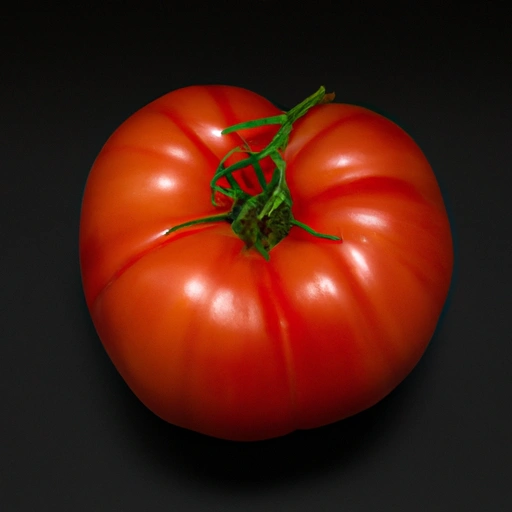Beefsteak Tomato
Description

The beefsteak tomato is a large, meaty variety of tomato that is prized for its size, flavor, and versatility in the kitchen. The term 'beefsteak' refers to the fruit's substantial size and hearty texture, making it a popular choice for sandwiches, salads, and a myriad of culinary applications. It is characterized by its round and slightly flattened shape, with a bright, typically red skin, though some heirloom varieties may exhibit shades of pink, purple, or even green. The beefsteak tomato can weigh between 6 ounces (170 grams) to a pound (450 grams) or more, providing a substantial addition to any dish.
Common uses
Beefsteak tomatoes are widely used in a variety of dishes, from raw applications like salads and sandwiches to cooked preparations such as sauces, soups, and stews. They are often sliced for use in hamburgers and deli sandwiches due to their size and firm texture, which holds up well under condiments and other toppings. Additionally, beefsteak tomatoes are a popular choice for grilling and roasting, as their flesh is solid enough to retain structure when exposed to high heat.
Nutritional value
Calories
A typical beefsteak tomato (approximately 6 ounces or 170 grams) contains around 33 calories (138 joules).
Protein
It has about 2 grams of protein.
Fat
Beefsteak tomatoes are very low in fat, containing less than 0.5 grams per serving.
Carbohydrates
The carbohydrate content is around 7 grams, primarily from natural sugars and dietary fiber.
Vitamins
Beefsteak tomatoes are an excellent source of Vitamin C and also provide Vitamin A, Vitamin K, and several B vitamins.
Minerals
They contain minerals such as potassium and magnesium and smaller amounts of calcium and iron.
Health benefits
In addition to being low in calories and fat, beefsteak tomatoes are high in dietary fiber and antioxidants, such as lycopene, which has been linked to reduced risk of heart disease and certain cancers. The high vitamin C content aids in immune function and skin health, while the potassium supports healthy blood pressure levels.
Potential risks
For individuals with tomato allergies or intolerances, consuming beefsteak tomatoes may cause adverse reactions. Additionally, those with acid reflux or gastroesophageal reflux disease (GERD) may experience discomfort when eating acidic foods like tomatoes.
Common recipes
Beefsteak tomatoes are a classic ingredient in Caprese salad, BLT sandwiches, and are the preferred type for many tomato-based pasta sauces. They also make excellent additions to fresh salsas, bruschettas, and gazpacho.
Cooking methods
These tomatoes can be enjoyed raw, roasted, grilled, sautéed, or stewed. They are versatile enough to be included in both cold and hot preparations.
Pairing with other ingredients
Beefsteak tomatoes pair well with fresh herbs like basil and oregano, cheeses such as mozzarella and feta, and proteins like chicken, beef, and seafood. They also complement the flavors of olives, capers, and balsamic vinegar.
Summary
The beefsteak tomato is a versatile and nutritious ingredient that can be incorporated into a wide range of dishes. Whether you're looking for a fresh addition to a salad or a robust flavor for a cooked meal, the beefsteak tomato offers a delightful balance of taste and texture that is enjoyed by food lovers across the world.